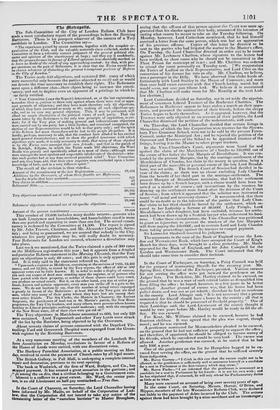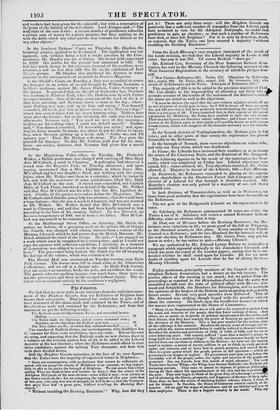In the Court of Exchequer, on Saturday, a Privy Council
was held for the purpose of nominating Sheriffs tar the ensuing year. Mr. Spring Rice, Chancellor of the Exchequer, presided. Various excuses for riot serving the office were put forward for gentlemen on the Judges' lists. For Berkshire, Mr. Hartley claimed to be excused, on the ground that he was a man of such retired habits as disqualified him from filling the office : he hoped, however, in a few years to be better qualified. Another ground of excuse was, that his house had been pulled down, and was not as yet rebuilt ; therefore he had no residence in the county. Lord Abinger said, " It is not necessary that a person nominated for Sheriff should have a house in the county ; all that is required is that he should be possessed of freehold property." One of their Lordships said, the Lord- Lieutenant of the county thought it would be two years before Mr. Hartley would be ready to fill the of- fice. He was excused.
For Kent, Mr. Williams claimed to be excused, because he had fourteen children. It was agreed that the plea was cogent, though novel ; and he was excused.
A gentleman nominated for Monmouthshire pleaded to be excused, on the ground that he had not sufficient property to support the office; and therefore, if appointed, he should be obliged to borrow money of his friends, which he considered would be very hard. The excuse was allowed. Another gentleman was excused, as he stated that be had only 100/. a year. One of the gentlemen on the list for Hampshire begged to be ex- cused from serving the office, on the ground that he suffered severely from indigestion. Mr. Baron Gurney—"! think in this cage that the excuse ought not to be allowed, as the gentleman is sufficiently well to announce himself as a candidate for a seat in Parliament at the first vacancy which may occur." Mr. Baron Parke-4. I arn informed that the gentleman is announced as a candidate tore seat in Parliament by his friends it is not his own wish ; and he has stipulated that, if returned, he will only attend his Parliamentary duties as little as he likes."
Many were excused on account of being over seventy years of age. In the same Court, on Saturday, Messrs. Hector, O'Brien, and Rippon, members of the late Westminster Reform Club, were declared not liable to the payment of debts incurred by the Club. The actions against them bad been brought by a wine-merchant and an ironmonger; and verdicts had been given for the plaintiffs, but with a reservation of thepoint of the liability of the defendants. Lord Abinger said—" The real] state of the case is this : a certain number of gentlemen subscribe a certain sum of money for a given purpose, but have nothing to do with the debts which any other parties may contract for dinners or for any other objects."



























 Previous page
Previous page